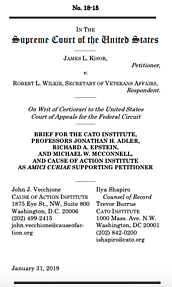Learn more about Cato’s Amicus Briefs Program.
Those who hold the reins of political power will not always be benevolent, self-restrained public servants — and the procedural safeguards that seem frustrating and counterproductive in one instance may very well be necessary bulwarks in another. Those safeguards are undermined by the Supreme Court’s requirement that courts give deference to a regulatory agency’s interpretation of its own rules. Under this principle, known as the Auer doctrine, agencies can bind the public without affording either notice or incorporating public input.
Consider James Kisor, a Vietnam veteran whose claim for disability benefits hinged on the interpretation of the term “relevant” in the Board of Veterans Appeals rules of procedure. The agency last amended its rules in a more formal notice-and-comment proceeding in the mid-Aughts. During a notice-and-comment rulemaking, agencies seek input from the public on proposed rules. During that rulemaking, the Department of Veterans Affairs could have defined evidentiary “relevance,” but it declined to do so. Only when the board denied Mr. Kisor’s full claim — eight years later — did the agency announce its interpretation unprompted and without having been briefed on the matter. Obviously, Mr. Kisor was given no advance notice of the new “rule” — which was really just a new interpretation of the word — much less the opportunity to participate in the formulation of regulations that ultimately would curtail his federal rights.
Mr. Kisor appealed the denial of his claim to the Veterans Court, which sided with the government. He then sought review of the Veterans Court’s decision before the U.S. Court of Appeals for the Federal Circuit, which, again, sided with the government. The three-judge panel determined that the term “relevant” was ambiguous, and that both parties had advanced reasonable interpretations. Nevertheless, the court sided with the agency, based on the Auer doctrine.
In December 2018, the Supreme Court granted Mr. Kisor’s petition for certiorari on the question of whether to overrule the Auer doctrine. Cato, joined by Professors Jonathan H. Adler, Richard A. Epstein, and Michael W. McConnell, as well as the Cause of Action Institute, has filed a brief supporting overruling Auer and arguing that the judiciary should no longer blindly accept self-serving agency interpretations. Instead, judges should make their own independent determinations based on a searching and reasoned reading of the regulations at issue.
We argue that Auer, by concentrating lawmaking and law-interpretation in regulatory agencies, both offends separation of powers principles and facilitates procedural shortcuts. Auer deprives regulated entities of fair notice, which is fundamental to the integrity of the law, and also robs administrative policymaking of legitimacy by allowing agencies to avoid public participation in the formulation of their rules. Finally, despite some predictions that overturning Auer will wreak havoc in administrative agencies, we point out that independent judicial assessment will only change the outcome in a small minority of cases. Overturning Auer is an important step towards reining in the administrative state.

This work is licensed under a Creative Commons Attribution-NonCommercial-ShareAlike 4.0 International License.



